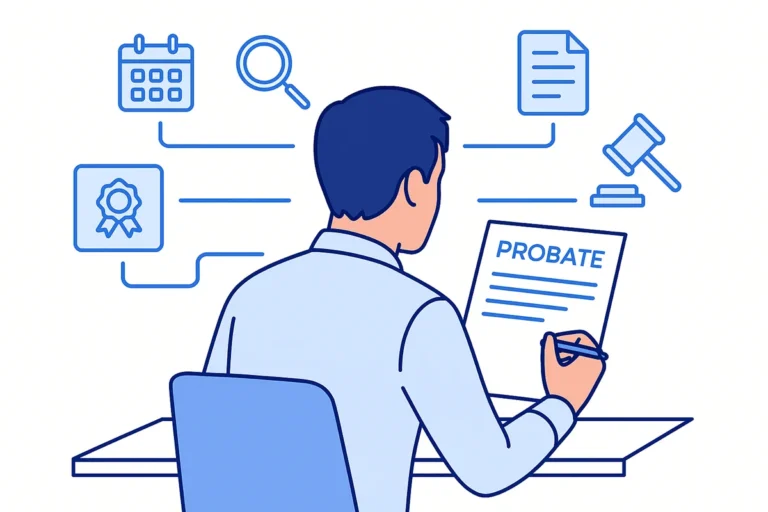

If you’ve recently lost someone and keep hearing the term “probate”, you’re not alone.
Many executors and family members suddenly find themselves wondering “What does probate mean?” — what to do next, and whether they need legal help — all while managing questions from beneficiaries about when they’ll receive their inheritance. It can feel overwhelming.
Understanding ‘what does probate mean’ early in the process is essential. While there’s a lot to take in, gaining clarity now can help you manage the estate with confidence and avoid costly mistakes.
So, what does probate mean in simple terms? It’s the legal process of confirming that a Will is valid and giving the named executor authority to manage and distribute the deceased person’s estate.
If there’s no Will, a similar process applies, but you’ll need to apply for Letters of Administration, which allows the court to appoint someone (usually the next of kin) to take on that responsibility.
Once you know ‘what does probate mean’ and what’s involved, you can approach each stage of the process with far more confidence and structure.
Probate acts as the link between someone’s death and the distribution of their assets.
When done correctly, it ensures the estate is handled legally and fairly, protecting both beneficiaries and those responsible for administering the estate.
However, if the estate is mismanaged or distributed incorrectly, executors (if there is a Will) or administrators (if there is not) can expose themselves to personal financial risk. Beneficiaries can hold them liable for any losses caused by mistakes, omissions, or lack of protection.
Although the details will vary depending on the estate’s complexity, most executors will need to complete these key steps:
Obtain the official death certificate and several certified copies. Banks, insurers, HMRC, and other financial institutions will require these.
Confirm that you have the most recent version and identify the person(s) named as executor. If there’s no Will, the next of kin will usually apply to become the administrator.
Protect any property, list all assets and debts, and arrange professional valuations where necessary. This ensures the estate is correctly valued for tax and insurance purposes.
If the deceased owned a home, it’s essential to ensure the property is adequately insured.
A Probate Property Insurance policy, such as those offered by Insuristic, provides broad cover explicitly designed for empty homes in probate. It can help protect both the property’s value and the liability of executors or administrators in the event of a claim.
You can learn more about your liability when it comes to insuring property on our Executor Home Insurance page.
This legal document confirms your authority to act on behalf of the estate. You’ll need it before selling property, transferring ownership, or accessing financial accounts.
Pay any outstanding debts, final bills, and taxes, including Inheritance Tax and Income Tax. Executors are personally responsible for ensuring these are paid before assets are distributed.
Executors and administrators can also be held personally liable if a third party — such as an unknown creditor, dependant, or missing beneficiary — makes a claim against the estate.
Products such as Estate Protect from Insuristic provide affordable indemnity insurance for these scenarios, covering risks like:
These policies help executors and beneficiaries avoid financial loss if a claim arises after the estate’s distribution.
Once all debts and liabilities are settled and any indemnity cover is in place, the estate can be distributed to beneficiaries in line with the Will or intestacy rules.
Executors should retain full records of all transactions and correspondence for at least 12 years. This provides essential evidence if a claim or dispute arises after distribution.
Legally, what does probate mean for executors and administrators? In practice, it means assuming legal authority and personal responsibility for managing the estate properly. Getting this wrong can potentially incur a lifetime of liability if mistakes, omissions, or failures to protect beneficiaries from financial loss occur.
Executors (or administrators if there’s no Will) act as fiduciaries, meaning they have a legal duty to manage and protect the estate correctly.
Unfortunately, private individuals acting in this role cannot insure themselves for errors or omissions, only for third-party claims.
This is why it’s essential to carefully consider your role, the complexity of the estate, and your confidence in managing it and the risks involved before you begin administration.
If you have any concerns about your ability, the potential for claims, or the time required, it may be wise to appoint a solicitor to assist or even handle the estate entirely.
Beneficiaries may sometimes question this cost, but ultimately, it’s your liability and financial future you are protecting, and the solicitor’s fee is paid from the estate, not your own pocket.
For a detailed breakdown of your obligations, see our Executor Duties Guide.
These duties aren’t optional; they’re legal obligations. Executors can be held personally liable if something goes wrong, even when acting in good faith.
While probate provides legal authority, it also brings potential exposure. Executors and administrators carry personal responsibility for ensuring the estate is managed correctly — and if something goes wrong, they may be held financially liable.
Common risks include:
Uninsured or uncovered losses will usually fall to the executors or administrators to resolve. These can arise from:
That’s why planning and taking protective measures, such as arranging the right insurance and seeking professional legal advice where needed, is so important.
Probate doesn’t have to be stressful or risky. With the right protection and planning, executors and administrators can fulfil their duties confidently, protect beneficiaries, and reduce unnecessary delays.
To make this easier, read this Executor Insurance and Risk Management Checklist (also suitable for administrators) which outlines:
You can read more about the checklist here or download it directly to help you stay organised and protected throughout the probate process.
Probate can seem confusing, and it’s easy to come across conflicting information. Here are some of the most common misconceptions:
For more details, see our When Is Probate Required? blog.
If you’ve been newly appointed as an executor or administrator, this Probate Checklist may help you understand the practical steps involved in managing an estate.
Please note, it’s not legal advice, but a list of the most common tasks people in your position need to complete. If you’re in any doubt, it’s best to seek professional legal guidance.
This checklist covers every stage of estate management, including:
Following this checklist can help you approach the administration of the estate in a clear and logical order.
As we have already mentioned, you should also read Insuristic’s Executor Checklist, which provides additional guidance from an insurance and risk management perspective, helping you protect both yourself and the estate during the probate process.
Probate can feel daunting, but you don’t have to manage it alone.
Insuristic provides clear guidance, tools, and protection products that make the process simpler and safer.
Explore our other free resources:
Dealing with probate can feel daunting at first. But by learning ‘what does probate mean’ in relation to your situation early in the process, you can make informed decisions about the best way to manage the estate, whether you handle the process yourself, work alongside a law firm, or appoint solicitors to manage everything on your behalf.
Whichever route you choose, Insuristic is here to support you every step of the way. We provide clear guidance, access to trusted legal advice, free practical tools, and specialist insurance designed to protect both you and the estate throughout the probate journey.
Legal Disclaimer:
This article is for general information only and should not be taken as legal advice. If you need specific guidance on probate or estate administration, please seek professional legal advice — you can find a probate solicitor here.

Rob Faulkner is a leading expert in executor insurance risk and probate insurance, with nearly 30 years’ experience in the UK insurance market. He is the founder of Insuristic, a specialist provider of probate-related insurance solutions and educational content for executors.
Rob is an ACII Chartered Insurance Broker, a Chartered Manager, and a Member of the Chartered Institute of Marketing. His background spans insurers, brokers, and Insurtechs, always focused on innovation, transparency, simplicity, and fair value.
He’s passionate about helping everyday people, executors, beneficiaries, and law firms choose the right probate property insurance or unoccupied home insurance, without jargon, inflated fees, or hidden commissions.
Rob is especially passionate about product development and improving insurance education through marketing, helping people understand what they are buying. These values sit at the heart of everything we do at Insuristic.
Want to learn more? Visit my author page or follow me on LinkedIn.

Insuristic Limited is an Appointed Representative of SJL (Worcester) Ltd, who are authorised and regulated by the Financial Conduct Authority with the reference number 763599. This can be checked by visiting https://register.fca.org.uk/s/.
Registered Office: Unit 2, 262 Walsall Road, Cannock, England, WS11 0JL. Registered in England and Wales No: 13926650.
Insuristic is a registered trademark. ©Copyright 2023 Insuristic Limited. All Rights Reserved.